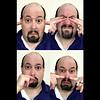Take a photo of a barcode or cover
A worthy swan song to a singular legacy. Vonnegut’s meta stream-of-consciousness celebrates and condemns the idiosyncrasies of life, revealing profound wisdom along the way. I always enjoy my time with Kurt.
A very unique book with an interesting story that has a catch that is well enveloped into the story, though not overdone which I was thankful for.
More of a memoir with a yarn thrown in helter skelter. I am not one for page marking and notes and such, but I cannot count the number of times I had to still my hand from dog-earing the pages of this short novel.
I miss him even more--this wonderful, beautiful, eloquent man.
I miss him even more--this wonderful, beautiful, eloquent man.
I initially read this so-called novel around the time it was first released as a paperback, and I recall being deeply disappointed by it. Ill-formed, sketchy, and awkwardly cobbled together, it seemed to end Vonnegut's career as a novelist with a whimper. Having now re-read it within the context of his entire previous body of work, I'm slightly more inclined to be charitable, although I'd hardly rank this among his best works.
Vonnegut's early novels (barring the uneven "Player Piano," his first) were revelatory, but he seemed to become mired as a writer during the 1970s. The 1980s were a better decade for him, and until 1990's "Hocus Pocus" (his last novel before "Timequake"), he seemed to have enjoyed a genuine creative renaissance. But "Hocus Pocus" was a weak effort and Vonnegut showed signs of tiring. He followed it with "Fates Worse Than Death," a strong non-fiction collection, and then, evidently, spent the next six years trying, unsuccessfully, to write another novel. In the end he chose to publish "Timequake" which included what amounted to excerpts from that abandoned effort combined with more of the sort of autobiographical material which formed the lion's share of "Fates Worse Than Death." This ended up being an unfortunate decision in more ways than one.
First, and perhaps most glaringly, "Timequake" was presented and marketed as a novel, which it really isn't. So those (like me in 1998) who were expecting a novel were bound to be bitterly disappointed on this count alone. The fragments of the abandoned novel which are included could probably have formed the basis of a longish short story, but not quite a novella. On the plus side, it allowed Vonnegut to end his career as a writer of fiction by focusing on the one character he had developed most fully over the years, and who had recurred most frequently in his novels, the under-appreciated wretch of a science fiction author, Kilgore Trout.
The rest of "Timequake," its autobiographical musings, would have been too slight, taken on their own, to form a full-length follow-up to "Fates Worse Than Death." In a life as long as Vonnegut's, after all, six years is not much of an accretion of new experiences, even despite the death of his older brother from cancer, which took place over the period in which he was assembling this book.
Thus, with not quite enough for a full volume of non-fiction, and hardly enough for an entire novel, he chose to blend the two into a hybrid which exposes the weaknesses of both halves conspicuously. It might have been better if he had taken more time, fleshed out the autobiographical material, and reshaped the fiction as a short story which could have been included as a sort of bonus, without trying to interleave what amounted to two very different and incompatible works. Perhaps it was simply an honest experiment that failed, but one has the sense that it was more of a last-ditch effort at salvaging six years of hacking away at a novel that didn't want to be written. Fortunately, this misstep would be partially atoned for by the release, a couple years later, of an excellent volume of collected short fiction, in addition to a variety of other relatively strong non-fiction titles which he continued to produce sporadically right up to the end.
My rating here is generous by about half a star. For completists only.
Vonnegut's early novels (barring the uneven "Player Piano," his first) were revelatory, but he seemed to become mired as a writer during the 1970s. The 1980s were a better decade for him, and until 1990's "Hocus Pocus" (his last novel before "Timequake"), he seemed to have enjoyed a genuine creative renaissance. But "Hocus Pocus" was a weak effort and Vonnegut showed signs of tiring. He followed it with "Fates Worse Than Death," a strong non-fiction collection, and then, evidently, spent the next six years trying, unsuccessfully, to write another novel. In the end he chose to publish "Timequake" which included what amounted to excerpts from that abandoned effort combined with more of the sort of autobiographical material which formed the lion's share of "Fates Worse Than Death." This ended up being an unfortunate decision in more ways than one.
First, and perhaps most glaringly, "Timequake" was presented and marketed as a novel, which it really isn't. So those (like me in 1998) who were expecting a novel were bound to be bitterly disappointed on this count alone. The fragments of the abandoned novel which are included could probably have formed the basis of a longish short story, but not quite a novella. On the plus side, it allowed Vonnegut to end his career as a writer of fiction by focusing on the one character he had developed most fully over the years, and who had recurred most frequently in his novels, the under-appreciated wretch of a science fiction author, Kilgore Trout.
The rest of "Timequake," its autobiographical musings, would have been too slight, taken on their own, to form a full-length follow-up to "Fates Worse Than Death." In a life as long as Vonnegut's, after all, six years is not much of an accretion of new experiences, even despite the death of his older brother from cancer, which took place over the period in which he was assembling this book.
Thus, with not quite enough for a full volume of non-fiction, and hardly enough for an entire novel, he chose to blend the two into a hybrid which exposes the weaknesses of both halves conspicuously. It might have been better if he had taken more time, fleshed out the autobiographical material, and reshaped the fiction as a short story which could have been included as a sort of bonus, without trying to interleave what amounted to two very different and incompatible works. Perhaps it was simply an honest experiment that failed, but one has the sense that it was more of a last-ditch effort at salvaging six years of hacking away at a novel that didn't want to be written. Fortunately, this misstep would be partially atoned for by the release, a couple years later, of an excellent volume of collected short fiction, in addition to a variety of other relatively strong non-fiction titles which he continued to produce sporadically right up to the end.
My rating here is generous by about half a star. For completists only.
It is a bizarre book, meanders, but I quite enjoyed it.
You were sick, now you're better, there's work to be done.
This is distilled Vonnegut, but distilled about a decade before he died and soon after his brother's death. Think Breakfast of Champions and God Bless You, Mr. Rosewater, but in the final act of a manmade timequake. His belief in socialism and humanism (or religion at all, for those who need it) as tools to make life more bearable run strong, but the timing of this book tinges his messages. Maybe things like a living wage are for the birds, maybe people won't be able to gain strength by connecting with others, maybe he's been driving at the same message too many times and it hasn't taken yet.
Timequake is an essential chapter to understand Vonnegut. But as a novel, it's more of a collection of thoughts, dick jokes, various plot threads and autobiographical passages. It does hang together, but it's not as focused as some other novels. But, it's a fantastic source of what Vonnegut is remembered best for, and who could ask for more?
Timequake is an essential chapter to understand Vonnegut. But as a novel, it's more of a collection of thoughts, dick jokes, various plot threads and autobiographical passages. It does hang together, but it's not as focused as some other novels. But, it's a fantastic source of what Vonnegut is remembered best for, and who could ask for more?
funny
funny
hopeful
informative
inspiring
lighthearted
medium-paced
Plot or Character Driven:
A mix
Strong character development:
Complicated
Loveable characters:
Yes
Diverse cast of characters:
Yes
Flaws of characters a main focus:
No





